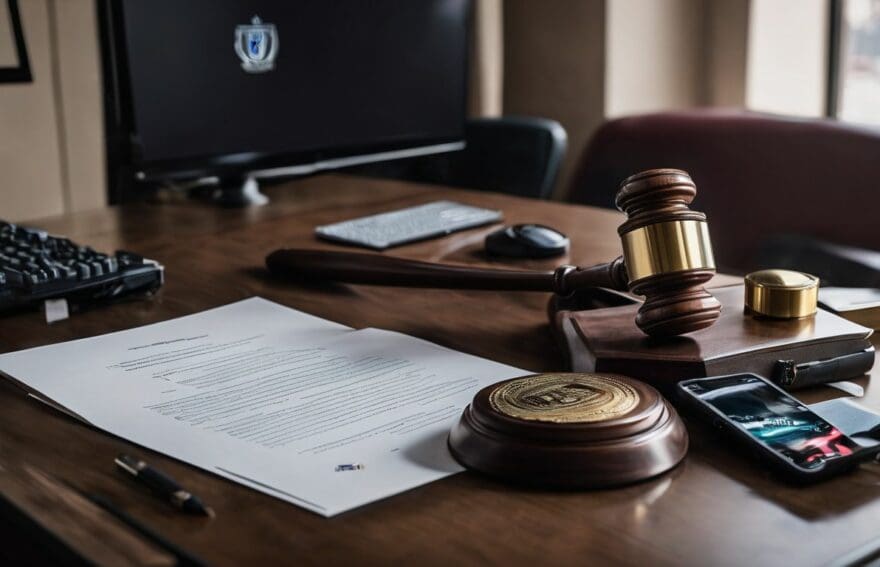The Legal Side of Esports: Contracts, Rights, and Regulation

Updated On: November 28, 2025 by James Connolly
Navigating the intricate world of professional gaming can often feel like traversing a veritable labyrinth of legal quandaries, transforming what should be pure competition into a rather perplexing affair.
Trust us, we’re familiar with the slog through contracts thick as bramble and regulations that could befuddle even the most astute minds—a recent study indicates esports revenues are on track to smash past the $1 billion milestone this year, elevating the stakes to unprecedented heights.
Our blog is here to gently unravel this complex tapestry for you. So go ahead and immerse yourself in our expert guidance for making sense of esports law—ensuring your gameplay remains above board and thoroughly equitable!
Understanding Esports Contracts
Esports contracts have unique dynamics that require careful consideration, such as compensation structures and player representation. Seeking legal advice is crucial to navigate the complexities of these agreements.
The unique dynamics of esports contracts
In the fast-paced world of competitive gaming, the contracts that bind players and teams come with their own set of challenges. We’re seeing deals that have to balance a player’s personal brand, streaming rights, and competition requirements.
Esports legal issues get complex quickly when we throw in factors like digital revenue streams from platforms such as Twitch or YouTube. Remembering to include terms for these aspects is essential for modern esports contracts.
Our role often involves negotiating agreements that protect both team interests and individual players’ rights. These documents are more than just a simple agreement; they’re tailored to handle intricate sponsorship deals, possibly involving multiple parties across different countries each with its own regulatory challenges.
Understanding this unique landscape enables us to navigate through the maze of employment law and intellectual property intricacies inherent in esports regulations.
Importance of seeking legal advice
Engaging with a legal professional is crucial for esports players and teams to ensure clear and fair contracts. Legal advice can help in understanding complex compensation structures, protecting intellectual property rights, and addressing issues of player representation.
As the industry grows, seeking legal guidance becomes even more vital to navigate endorsement agreements, sponsorship deals, and employment contracts in a rapidly evolving landscape.
Understanding the legal intricacies of esports helps safeguard player rights and protects against exploitation. With the emerging complexities in player contracts and intellectual property laws specific to gaming, seeking legal advice becomes an essential step towards ensuring fairness, protection, and compliance within the esports industry.
Protecting Intellectual Property Rights
Protecting intellectual property rights in esports is crucial for creators and teams. Understanding copyrights, trademarks, and patents can help ensure clear ownership and licensing agreements are in place to protect the valuable assets of the industry.
Copyrights, trademarks, and patents in esports
- Copyrights: Creative works such as game designs and software codes are protected under copyright law. This ensures that original content is not used without permission or proper compensation.
- Trademarks: Brands and logos associated with esports teams, tournaments, and gaming products are safeguarded through trademark registration. This prevents unauthorised use and misrepresentation of these brands.
- Patents: Innovative technologies or processes developed for gaming can be patented to protect them from being replicated or used without consent.
Importance of clear ownership and licensing agreements
Transitioning from understanding the complexities of copyrights, trademarks, and patents in esports, we recognise the critical importance of clear ownership and licensing agreements.
These agreements play a pivotal role in defining and protecting intellectual property rights within the esports industry. Clear ownership agreements establish who owns original content created by players or teams, ensuring fair compensation for their work.
Meanwhile, robust licensing agreements are essential for granting permission to use intellectual property while safeguarding against unauthorised use or exploitation. Understanding and negotiating these agreements is crucial for players, teams, and organisations to protect their creative assets and maintain control over their brand identity amidst the rapidly evolving landscape of esports.
Ensuring Fairness in Player Contracts
Navigating complex compensation structures and addressing issues of player representation are crucial aspects of ensuring fairness in esports player contracts. It’s important for players to have legal guidance when negotiating their contracts to ensure they’re being fairly compensated and represented.
Navigating complex compensation structures
Understanding the intricacies of complex compensation structures in esports contracts is essential for players, teams, and organisations. Negotiating fair remuneration requires clear terms outlining salary, bonuses, revenue sharing, and other potential income streams.
It’s crucial to seek legal counsel to ensure that compensation structures are transparent and reflective of the player’s or team’s value within the industry. Additionally, understanding the nuances of personal branding rights and endorsement deals is vital for maximising earning potential while safeguarding against potential exploitation.
Addressing issues related to player representation in negotiations can significantly impact navigating complex compensation structures. Ensuring that agents or representatives act in the best interests of players when structuring compensation packages is key to securing fair deals.
This involves clarifying roles, responsibilities, and obligations between players and their representatives to avoid conflicts of interest.
Addressing issues of player representation
Navigating complex compensation structures is just the beginning of the challenges faced by esports players. When it comes to player representation, legal support becomes paramount in ensuring fair treatment and protection of their rights.
Player contracts need to be carefully negotiated to address issues such as personal branding, remuneration, and contract length while also safeguarding against exploitation.
Esports companies must recognise the importance of providing adequate legal protection for players in endorsement deals, sponsorship agreements, and team contracts. As the industry continues to grow and evolve rapidly, addressing player representation through well-defined legal frameworks becomes essential in creating a level playing field for all parties involved.
Compliance with Regulations and Laws
Navigating the emerging legal landscape of esports is crucial for both players and organisations. From gaming regulations to considerations for international competition, understanding and complying with the laws that govern esports is essential for a successful and sustainable industry.
The emerging legal landscape of esports
Esports is rapidly evolving, and so too are the legal considerations that come with it. As the industry continues to gain popularity and profitability, there is an increasing need for established policies and guidelines to protect players from exploitation.
This includes navigating complex compensation structures, addressing issues of player representation, and ensuring fair treatment in labour contracts. Moreover, intellectual property rights are a significant concern in esports, distinguishing it from traditional sports due to broadcasting rights and video game licensing which demand clear ownership and licensing agreements.
In addition to these challenges, compliance with regulations and laws is also essential in the emerging legal landscape of esports. Considerations for international competition add another layer of complexity as teams often compete across various jurisdictions with differing gaming regulations.
Considerations for international competition
When participating in international esports competitions, it is crucial to consider the diverse legal landscapes that govern different regions. Understanding and complying with varying regulations, labor laws, and intellectual property rights across different countries can significantly impact a team’s success and reputation.
Ensuring that player contracts are legally sound and enforceable in international jurisdictions is also essential for protecting players’ rights and interests while competing on a global scale.
International copyright protection, trademark laws, and endorsement deal regulations may vary widely between countries. Therefore, seeking legal advice from professionals with expertise in international law can help esports teams navigate these complex legal considerations effectively.
Conclusion
In conclusion, the legal side of esports encompasses intricate contracts, intellectual property rights, and regulatory compliance. Players and teams must seek legal support to navigate endorsement deals, team agreements, and labor contracts.
Clear player contracts are essential for defining terms such as remuneration and personal branding. As the industry grows, there’s an increasing need for policies to protect players from exploitation.
Addressing these legal challenges is vital for ensuring fairness in esports.
FAQs
1. What kind of legal challenges do esports players face?
Esports players often run into legal challenges involving contracts with teams, rights to their image and performances, as well as regulations at esports tournaments.
2. Why are team agreements important in esports?
Team agreements lay out clear rules and expectations for both players and organisations, helping prevent disputes and protect everyone’s interests during competitions.
3. Can legal obstacles affect the outcome of esports tournaments?
Yes, unresolved legal issues can impact who is allowed to participate in tournaments and may even disrupt overall event planning if not addressed properly.
4. How does regulation play a role in the world of esports?
Regulation ensures fair play, helps maintain standards across different competitions, and provides a framework to manage issues related to contracts and player rights.


